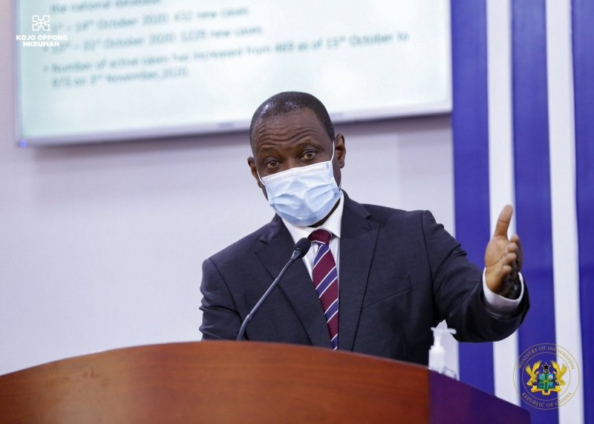The Ghana Health Service (GHS) says it is expecting more oxygen plants in the country by August 19 to provide life-saving support to severe cases of Covid-19 admissions.
Dr Patrick Kuma-Aboagye, the Director-General of GHS, told journalists at a media update on the Coronavirus in Accra, on Wednesday that, it had installed the recent oxygen plants it received at the Ga East Hospital. this has been used in supporting persons with severe cases.
He added that the Service has received 300 ultra-negative fridges to help store different types of Covid-19 vaccines for easy distribution to the regions and districts.
Each region, he said, received two of the ultra-negative refrigerator vans whilst UPS donated 16 oxygen plants to fight the virus.
Meanwhile, Volta, Bono, and Bono East Regions are emerging as new hotspots for Coronavirus infections, especially the Delta Variant.
The Greater Accra and Ashanti Regions remain the traditional hotspots.
The GHS said, for instance, the Volta Region, which recorded 16 active cases on July 1, has recorded 532 cases as of August 1, while the figures for the Bono Region increased from 8 cases to 200 and Bono East from 3 to 178.
Dr Kuma-Aboagye, the Director-General of Ghana Health Service (GHS), told the media during the Covid-19 Update in Accra on Wednesday that 79 percent of all Covid-19 cases in the Greater Accra Region were from the Delta Variant.
He said the Delta Variant, which had a higher transmission rate and severe disease burden, was becoming dominant and called for stricter enforcement of the safety protocols to prevent escalation of the virus.
He said the situation had resulted in the increased workplace and school infections, with active cases increasing from 1,600 to over 6,000 within a month.
The current active cases stood at 6,766 with 854 deaths as of August 1, 2021.
"The current trajectory of cases with low adherence to Covid-19 safety protocols, pose a significant risk of a higher third wave.
"Average cases per day is likely to increase with the attendant increase in severe and critical cases.
"The potential for a negative impact of the outbreak on all sectors is very high, therefore, aggressive efforts at reversing the trend is needed," Dr Kuma-Aboagye stated.
The Greater Accra Region now has 272 hospital admissions out of, which 36 are critical, 87 severe, and 107 mild to moderate cases.
On school infections, he said 404 schools had recorded positive cases of the virus with 2,864 cumulative positive cases and 304 active cases.
Latest Stories
-
Trump announces air strikes on three nuclear sites in Iran
39 minutes -
TESCON SD Dombo University condemns Stephen Amoah’s religious comment
1 hour -
Former SWAG President Ackah passes on
3 hours -
Maison Yusif unveils 2 new fragrances, opens flagship store in Accra
3 hours -
GOC, NSA commemorate International Olympic Day in Accra
3 hours -
Kalsoume Sinare, Namoale, 13 others land ambassadorial roles under Mahama
3 hours -
Photos: President Mahama arrives in Abuja for 67th ECOWAS Heads of State Summit
3 hours -
First batch of pilgrims from Mecca arrives in Tamale
3 hours -
Mahama appoints 15 new Ambassadors and High Commissioners
3 hours -
2 killed, three injured in tipper truck-taxi crash on Ntotroso-Kenyasi road
4 hours -
Heavy rain caused building collapse at Kotokuraba’s London Bridge area – Police
4 hours -
If religion was a factor, I would’ve stepped aside – Dr Bawumia warns against tribal politics in NPP
5 hours -
Okada rider survives brutal machete attack in Boinso, suspect arrested
5 hours -
Photos: Asantehene graces son’s graduation at DPS International
7 hours -
Deputy Works and Housing Minister visits Ecobank-JoyNews Habitat Fair Clinic
7 hours

